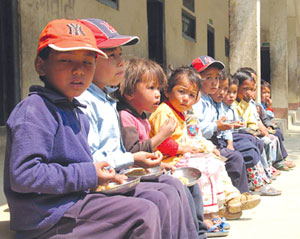|
|
| FOOD FOR THOUGHT: Children of Kalika Debi Primary School taking a day meal provided by WFP. |
The food is Puja's reward for coming to school everyday. It is given to the children of all the poor families here whose parents cannot provide enough daily food for themselves or their children, and so often opt to keep the kids at home rather than send them to school on empty stomachs.
With help from the World Food Programme's food for education program (FfE), many schools like Kalika have been able to motivate poor parents from food-deficit districts to send their children to school knowing that they'll be fed a free lunch.
Introduced in 1996, the FfE has helped to feed over 200,000 children in primary and lower secondary schools in 20 districts of the far west region. Without such programs the food shortage that is currently affecting the Karnali Zone could be much more acute. (see 'The West is hungry', #296).
"Such an initiative has already helped to enrol more children and successfully retained them," says Krishna Man Shrestha, a teacher from Kalika Debi School, which in the last three years has managed to enrol over 170 new students. Around 365 primary and lower secondary schools in Makwanpur have also introduced the FfE program.
"Children with empty stomachs can neither learn nor stay in schools," says Dina Lama, a local villager who works as Kalika's cook for Rs 1,500 a month, money that is raised by villagers who formed a food management committee to get, store and distribute the food provided by the WFP. Each student's family pays the committee a monthly fee of Rs 10 to cover the cook's salary.
"I'm here to check whether the children are being fed well and attending their class," says Thuli Golay, 50, a member of the committee, which regularly checks the school to ensure the children are attending. Because of the feeding program, her two granddaughters and a grandson have enrolled. "This would have never been possible without the help of the school and WFP," Golay explains.
Before the FfE, many students in the area did not attend classes regularly and most of them eventually dropped out. Local teachers say that most of them had to make a long walk home during lunch hour and never returned for afternoon classes.
"The feeding programme has been helpful mostly in enrolling and retaining girls in schools," said Jean Pierre de Margerie, acting director of WFP in Nepal. The UN organisation's programs will reach more than 450,000 students during the 2006-2007 school year.
To promote girl education, the FfE offers a special incentive for girl students: those attending at least 80 percent of classes receive two litres of vegetable oil a month. Around 128,000 girls, and their families, will benefit from the provision this year.
While it's well known that rural schools have been badly hit during the 10 years of Maoist conflict, closing frequently because of bandas, strikes, Maoist propaganda meetings or violence, many students have been absent because of hunger.
Nearly one million children miss school because of hunger in districts like Humla, Jumla and Kalikot in the Karnali region, according to the WFP's Lekh Raj Upadhyaya. "Around 12 million people in Nepal do not consume enough food daily, among them two million children under the age of five", added de Margerie.
On Sunday, Nepal will join the WFP's global 'Walk the World' day. Last year, over 200,000 people in 266 locations walked to raise money to feed 70,000 children around the world. This year, the event is expected to raise $ 5 million for WFP's global school feeding programme.
In Kathmandu, 1,500 children and 500 adults are expected to walk from Dasrath Stadium to Patan. "This initiative is to use a platform to raise millions of funds for hungry Nepali children," said Mark Squirrel, security officer for WFP Nepal, before leaving for Mt. Everest, which he plans to summit by Sunday.



